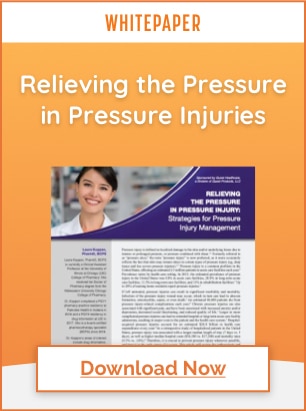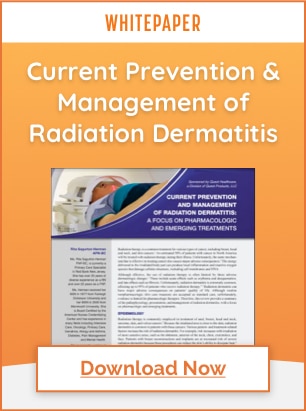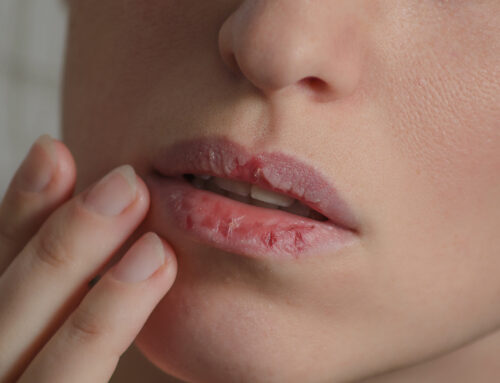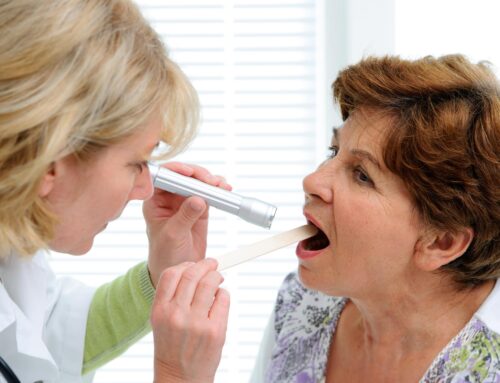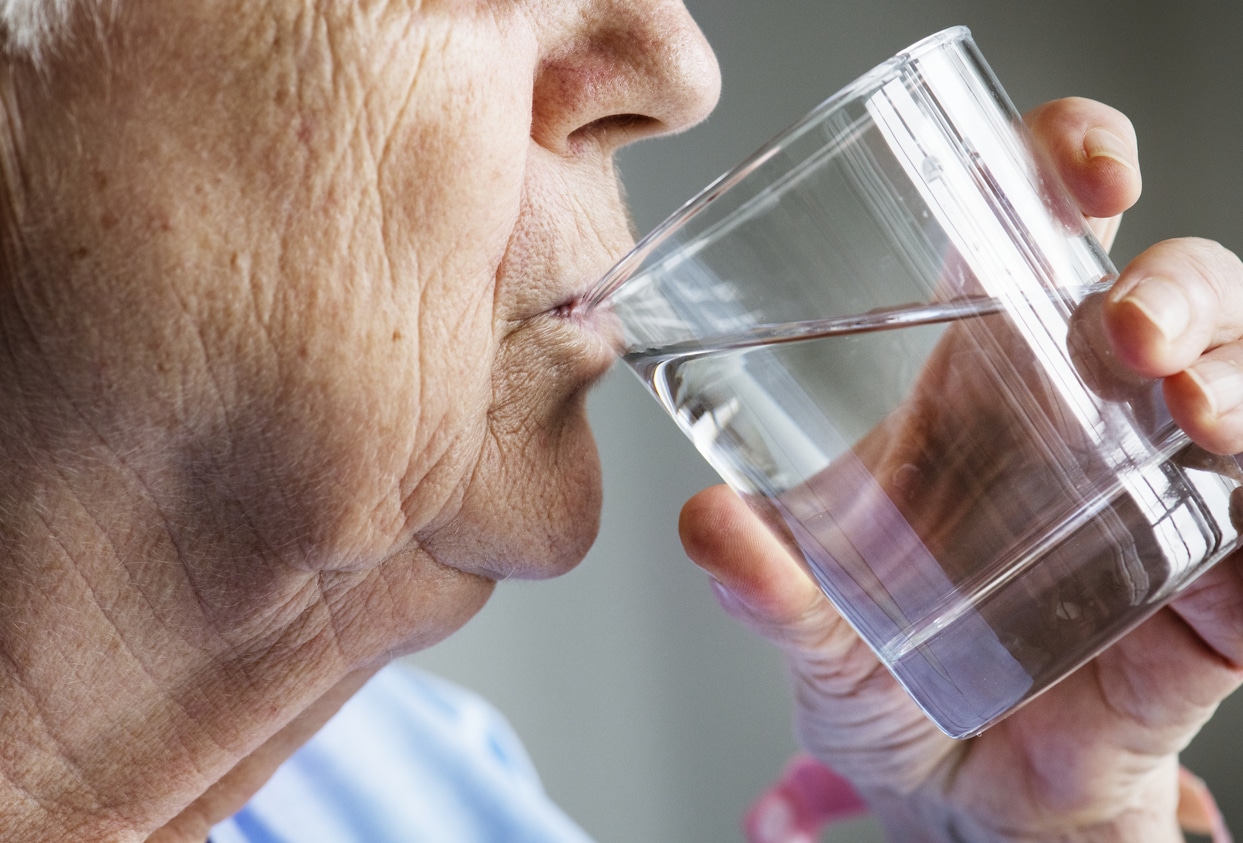
Xerostomia: Symptoms & Causes
Xerostomia affects approximately 20% of the global population and is more common in women than men. It occurs when the salivary glands no longer produce normal saliva flow due to medications, age, dehydration, illnesses, cancer treatment, and more.
Saliva production is an important aspect of patients’ overall health and wellness, as it helps control bacteria that could lead to infection. Saliva helps with digestion by moistening the mouth to chew, taste, and swallow food. It also washes away dead cells and food particles that build up on the gums, teeth, and tongue.
Signs and Symptoms of Xerostomia
Common signs and symptoms of dry mouth include:
- Dryness in the mouth
- Tooth decay
- Disturbed sleep
- White film on the tongue (oral thrush)
- Rough, dry tongue
- Altered taste sensation (e.g., a metallic taste)
- Halitosis (bad breath)
- Difficulty speaking
- Thick or stringy saliva
- Difficulty swallowing and chewing
- Difficulty wearing dentures, especially when swallowing or speaking
- Mouth sourness or ulcers
- Dry, sore, and cracked lips in the corners of the mouth
- Dehydration
- Malnutrition (particularly in the elderly)
Causes of Xerostomia
While xerostomia can have a variety of causes, some of the most common for long-term care patients and/or the elderly include:
Medications: Nine out of ten people over the age of 65 take medications that can have dry mouth as a side effect.1 Most medications associated with dry mouth affect the sympathetic nervous system, thickening and limiting the flow of saliva. For long-term care patients, the most common medications that cause dry mouth include those treating depression, diarrhea, allergies, urinary incontinence, and anxiety.
Illness: Conditions such as Sjogren’s syndrome, Parkinson’s Disease, diabetes, and depression can cause dry mouth.
Chemotherapy and Radiation: Both Chemotherapy medications and radiation therapy of the head and neck can damage salivary glands and reduce the amount of saliva produced.
Aging: While aging in and of itself does not cause dry mouth, illnesses and medications that cause dry mouth are more common in the older population.
Lifestyle: Drinking alcohol, smoking tobacco, and inadequate hydration all increase risk of dry mouth.
Dry Mouth and Pain Medications
Pain medications – in particular opioid medications – slow the autonomic nervous system, which is responsible for the production and secretion of saliva, making dry mouth a common side effect.
Other common medications that can cause dry mouth include antihypertensives, antidepressants, analgesics, tranquilizers, diuretics, and antihistamines.
For patients taking pain medications that cause dry mouth, using the lowest effective dose or switching to an alternative medication may help. Sipping water or sucking on ice chips can help moisturize the mucosa of the mouth and could alleviate symptoms.
Dry Mouth in the Elderly
Dry mouth is a condition that is often overlooked in the elderly as it can be slower to develop and harder to diagnose, but it can have more serious health consequences than it does for younger people.
Tooth decay is common with dry mouth, and causes mouth pain, sensitivity to heat/cold, and dryness which can damage the hard and soft tissues in the mouth. Dry mouth can loosen dentures, cause cracked lips, and increase risk of developing mouth sores. When dry mouth becomes more severe, the ability to chew and swallow food can become dangerously impaired. These conditions lead to a reduction in appetite which can cause malnutrition and other serious health conditions.
Preventing and Relieving Dry Mouth
Relieving and preventing dry mouth can significantly improve patients’ quality of life, increase overall wellness, and encourage good eating and nutritional habits.
Hydration: It’s important for patients to stay adequately hydrated throughout the day to relieve and prevent dry mouth. Increasing fluid intake enhances moisture in the mouth and throughout the body. Sipping water frequently also provides immediate relief to discomfort and/or pain caused by dry mouth.
Eliminate Caffeine, Alcohol, and Tobacco Products: Caffeine and alcohol dehydrate the entire body, including the mouth. Reducing or eliminating a patient’s caffeine and/or alcohol intake helps reduce dry mouth symptoms and prevent future bouts. Tobacco products of any kind cause oral dryness and exacerbate tooth and gum decay and should be avoided or eliminated.
Avoid Alcohol-Based Mouthwash: Alcohol-based mouthwash increases mouth dryness. Patients should use alcohol-free or “sensitive formula” mouthwash instead.
Sugar-Free Hard Candy: When the mouth tastes something pleasant, it naturally increases saliva production. For patients with dry mouth, sucking on a sugar-free hard candy or chewing sugar-free gum helps prevent dry mouth during the day without the risk of increasing tooth decay with sugary treats.
Humidifier Use: Sleeping, especially for people who breathe through their mouth, can increase the risk of dry mouth. Using a humidifier at night to moisten ambient air is helpful.
Dental Health: Ensure patients brush at least twice a day with a fluoride toothpaste and floss regularly.
Xylimelts® Can Help
XyliMelts® are the only oral-adhering discs that stick to teeth or gums to help relieve persistent dry mouth. Use XyliMelts® during the day or while sleeping for temporary relief from frequent thirst, sticky dryness in the mouth and throat, and other unpleasant dry mouth symptoms.
Made with xylitol, a natural sweetener that helps stimulate saliva flow, XyliMelts® utilize adhering disc technology to slowly release 550 mg of xylitol, which is most effective when continuously released and lingers in the mouth, especially when used while sleeping when saliva flow is lowest. XyliMelts® last for hours, moisturizing and coating the mouth for optimal comfort. The mild mint flavor freshens breath and the xylitol may reduce the risk of tooth decay.
Request samples for your facility today.
Disclaimer: The material contained is for reference purposes only. Quest Healthcare, A Division of Quest Products, LLC, does not assume responsibility for patient care. Consult a physician prior to use. Copyright 2021 Quest Healthcare, A Division of Quest Products, LLC.
Sources:
- https://www.agingcare.com/articles/dry-mouth-in-elderly-147642.htm
- https://www.mayoclinic.org/diseases-conditions/dry-mouth/diagnosis-treatment/drc-20356052
- https://www.pharmacytimes.com/view/drug-induced-dry-mouth
- https://odha.on.ca/wp-content/uploads/2016/08/Dry-Mouth-fact-sheet.v2.pdf
- https://www.practicalpainmanagement.com/patient/treatments/medications/opioid-meds-are-making-mouth-so-dry

